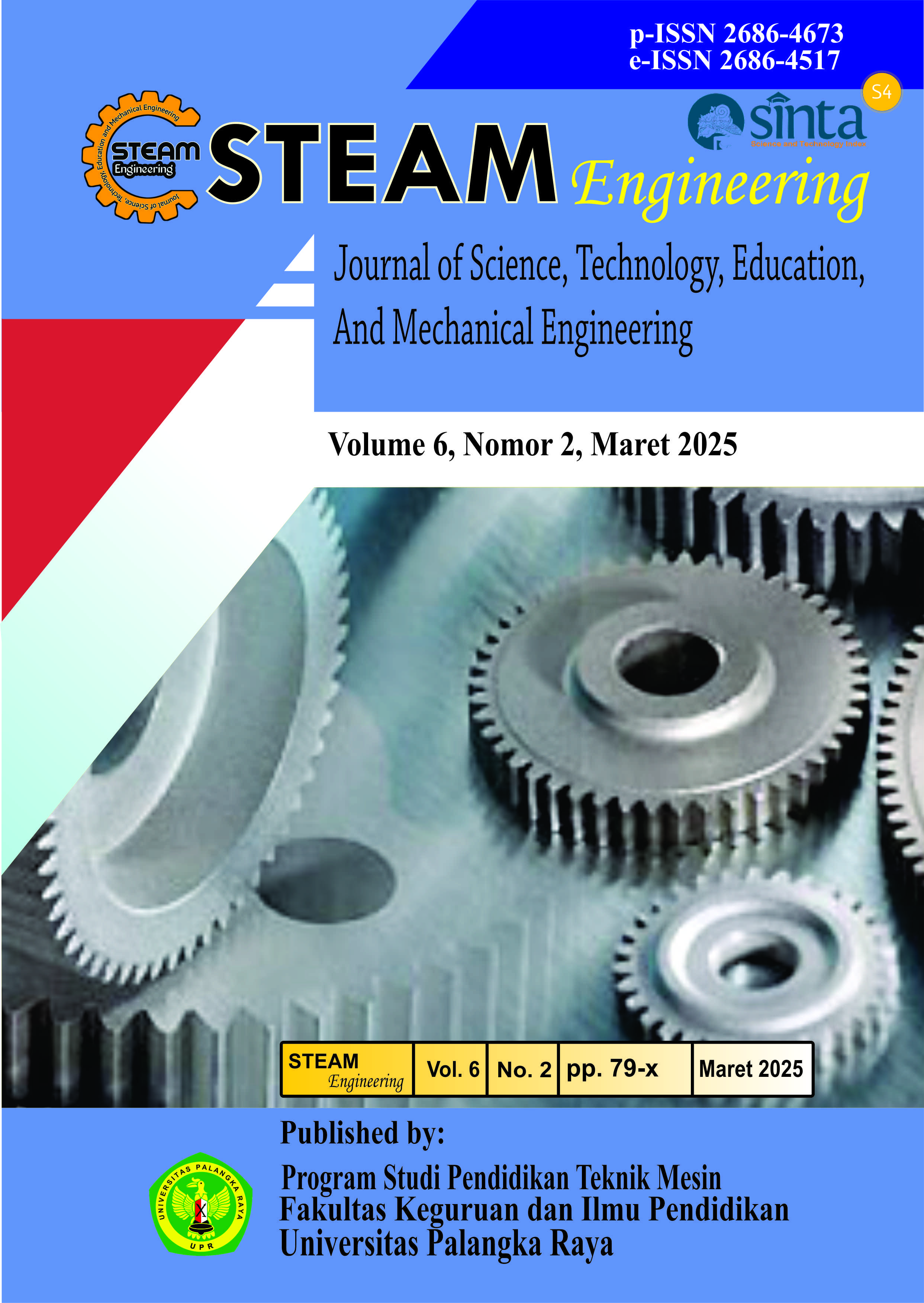PENERAPAN COOPERATIVE PEER INSTRUCTION BERBASIS ETNOGASTRONOMI UNTUK MENINGKATKAN LOCAL KNOWLEADGE
DOI:
https://doi.org/10.37304/jptm.v6i2.19647Keywords:
Javanese Culture, Cooperative Peer Instruction, Ethnogastronomy, Culinary, Local KnowledgeAbstract
This study aims to improve students' learning activities and cognitive learning outcomes, particularly related to local knowledge, in the subject of Basic Culinary Arts, specifically in the chapter Indonesian Food Processing, sub-chapter Javanese Dishes, through the implementation of the Cooperative Peer Instruction model integrated with ethnogastronomy. The research method used is Classroom Action Research (CAR). The subjects of this study were students of Class X-Culinary 2 at SMK YPM 2 Taman in the academic year 2024/2025. The instruments used included pre-tests and post-tests in each cycle, checklist-based observation sheets, and field notes. The data obtained were analyzed descriptively. Based on observations from Cycle I and Cycle II, there was an increase in the percentage of students' learning activities and cognitive learning outcomes. Respectively, the students' activity percentages were 59.03% and 70.48%, while the percentage of cognitive learning mastery was 62.5% and 78.125%. It can be concluded that the implementation of the Cooperative Peer Instruction model integrated with ethnogastronomy in the chapter Indonesian Food Processing, sub-chapter Javanese Dishes, in this study was able to improve students' learning activities and cognitive learning outcomes in the learning process.
Downloads
References
Abdillah, F., Ayuningsih, S. F., & Rachmat, T. A. (2023). Indigenous festival dan pembelajaran gastronomi pada program studi bisnis perhotelan. Jurnal Gastronomi Indonesia, 11(2). P3M Politeknik Pariwisata Bali. https://ejournal.ppb.ac.id/index.php/jgi
Arikunto, S., & Jabar, C. S. A. (2018). Evaluasi Program Pendidikan. Bumi Aksara.
Astuti, P. (2019). Implementasi cooperative peer instruction dalam pembelajaran. Jurnal Ilmu Pendidikan, 21(1), 67–75.
Badan Standar Nasional Pendidikan. (2006). Standar kompetensi dan kompetensi dasar SMK/MAK. BSNP.
Gollu, A. A., Muhali, M., Suryati, S., & Ahmadi, A. (2022). Analisis Kesulitan Siswa pada Pembelajaran Larutan Elektrolit dan Nonelektrolit di Masa Pandemi Covid-19 Menggunakan Model Discovery Learning. Empiricism Journal, 3(2), 301–307. https://doi.org/10.36312/ej.v3i2.1012
Hamdani, Jalinus, N., & Abdullah, R. (2024). Era baru pendidikan vokasi: Menuju Merdeka Belajar dan tantangan dunia kerja 4.0. JIPTEK: Jurnal Ilmiah Pendidikan Teknik dan Kejuruan, 17(2). https://jurnal.uns.ac.id/jptk/article/view/88904
Hikmah, F., & Uce, L. (2025). Menggali potensi siswa: Peran gaya belajar dalam proses pendidikan. Jurnal Penelitian Pendidikan Indonesia, 2(2), 407–414. https://doi.org/10.62017/jppi.v2i2.3238
Indriani, N. Meningkatkan keterampilan menulis tegak bersambung melalui media “Paris” papan bergaris siswa kelas 2 SD Negeri Pucangro 2 Gudo. Jurnal Jendela Pendidikan, 3(02), xx-xx. https://www.ejournal.jendelaedukasi.id/index.php/JJP
Kemmis, S., & Taggart, R. (1988). The Action Research. Victoria: Deakin University Press. Khotimah, S. (2020). Faktor-faktor yang memengaruhi minat wirausaha siswa kelas XI jurusan Jasa
Boga SMK Negeri 3 Purwokerto. Eduka: Jurnal Pendidikan, Hukum, dan Bisnis, 5(1), 21–30. https://openjournal.unpam.ac.id/index.php/Eduka/article/download/6145/4083/13121
Nurhasanah, N. N. (2021). The Civic Educational (PKn) Learning through Thematic Principle in an Effort Developing Moral Intelligence (Study of Qualitative in SD Laboratorium PGSD FIP UNJ 2010). American Journal of Educational Research, 3(6), 683–688.
Nurhayati, E., & Tim Peneliti. (2023). Inventarisasi makanan tradisional Jawa unsur sesaji di pasar- pasar Kabupaten Bantul. Jurnal Penelitian Humaniora, 19(2), 124–140. https://journal.uny.ac.id/index.php/humaniora/article/download/8039/6804
Prayunisa, F., & Mahariyanti, E. (2022). Analisa Kesulitan Siswa Sma Kelas X Dalam Pembelajaran Kuliner Pada Pendekatan Contextual Teaching and Learning Berbasis Two Tier Multiple Choice Instrument. Jurnal Ilmiah Global Education, 3(1), 24–30. https://doi.org/10.55681/jige.v3i1.167
Saputra C. S., Qosyim, A., Mahdiannur, M. A., & Norsaputra, A. (2024). Experiential learning integrated peer instruction: An innovative learning model to improve students’ science inquiry skills. Thabiea: Journal of Natural Science Teaching, 7(2), 221-237
Simatupang, A. (2021). Hubungan Motivasi Belajar Dengan Hasil Belajar Siswa Pada Mata Pelajaran Kuliner Di Sma Negeri 2 Kota Jambi. SECONDARY: Jurnal Inovasi Pendidikan Menengah, 1(3), 199–205. https://doi.org/10.51878/secondary.v1i3.346
Stojanovska, M., M. Petruševski, V., & Šoptrajanov, B. (2017). Study of the Use of the Three Levels of Thinking and Representation. Contributions, Section of Natural, Mathematical and Biotechnical Sciences, 35(1), 37–46. https://doi.org/10.20903/csnmbs.masa.2014.35.1.52
Tullis, J. G., & Goldstone, R. L. (2020). Why does peer instruction benefit student learning? Cognitive Research: Principles and Implications, 5(15). https://doi.org/10.1186/s41235-020-00218-5
Wijaya, S. (2019). Indonesian food culture mapping: A starter contribution to promote Indonesian culinary tourism. Journal of Ethnic Foods, 6(9). https://doi.org/10.1186/s42779-019-0009-3












